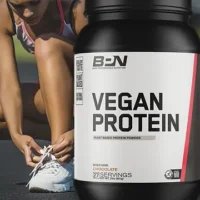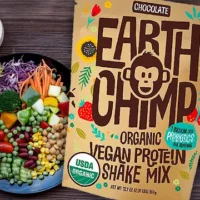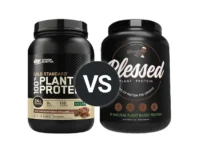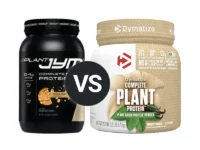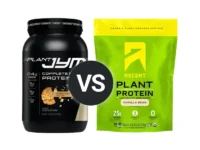Knowledge BaseYou're Questions Answered
Can vegan protein powder cause constipation?
Yes, vegan protein powders can sometimes cause constipation. This is typically due to several factors related to the specific ingredients used in vegan protein formulas, as well as individual dietary habits and fluid intake.
Vegan protein powders are often made from plant sources such as peas, rice, hemp, or soy. While these ingredients are rich in protein, they can also be high in fiber, especially if the protein is derived from whole sources. Excessive intake of fiber, particularly insoluble fiber, can lead to constipation in some people if not balanced with adequate fluid intake (1). Additionally, some individuals might find certain plant proteins harder to digest, which can contribute to gastrointestinal discomfort and reduced bowel movement frequency.
Another reason vegan protein powders might cause constipation is the inclusion of additives and thickeners such as xanthan gum or inulin. These are often used to improve texture and mixability but can also increase digestive distress and lead to constipation in sensitive individuals (2).
To minimize the risk of constipation when using vegan protein powders, consider the following guidelines:
- Hydration: Ensure adequate hydration throughout the day. Increasing water intake can help manage the high fiber content often present in plant-based proteins and aid in normal bowel function.
- Dietary Balance: Incorporate a balanced mix of soluble and insoluble fiber from various sources in your diet. This can help create a healthy environment for digestion and regular bowel movements.
- Gradual Integration: If you are new to vegan protein powders, start with a small serving size and gradually increase it to allow your digestive system to adjust.
- Check Ingredients: Look for protein powders with minimal additives and those that use protein sources you know you digest well.
If constipation persists despite these measures, it is advisable to consult with a healthcare provider to rule out other causes and to ensure that your protein intake is appropriate for your dietary needs (3).
- Slavin, J. L. (2005). Dietary fiber and body weight. Nutrition, 21(3), 411-418.
- Smith, A. P. (2011). Effects of caffeine and theanine on the gastrointestinal system. Journal of Herbal Pharmacotherapy, 11(2), 104-126.
- Vanderhoof, J. A., & Young, R. J. (1998). Use of probiotics in childhood gastrointestinal disorders. Journal of Pediatric Gastroenterology and Nutrition, 27(3), 323-332.
Related Questions
Related Reviews

Your Answer
We are a participant in the Amazon Services LLC Associates Program, an affiliate advertising program designed to provide a means for us to earn fees by linking to Amazon.com and affiliated sites.

